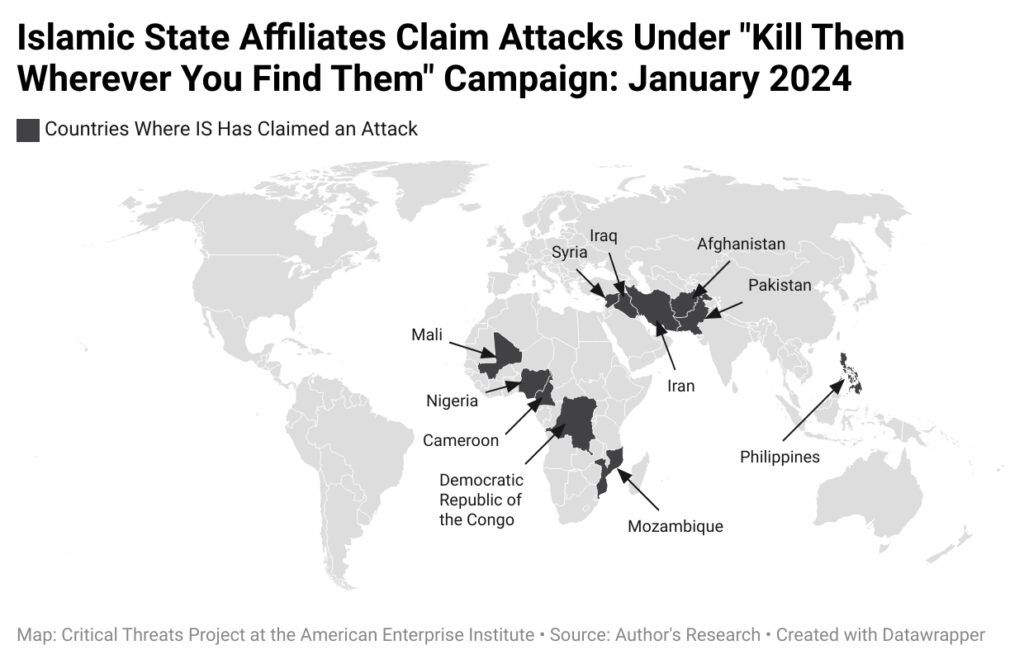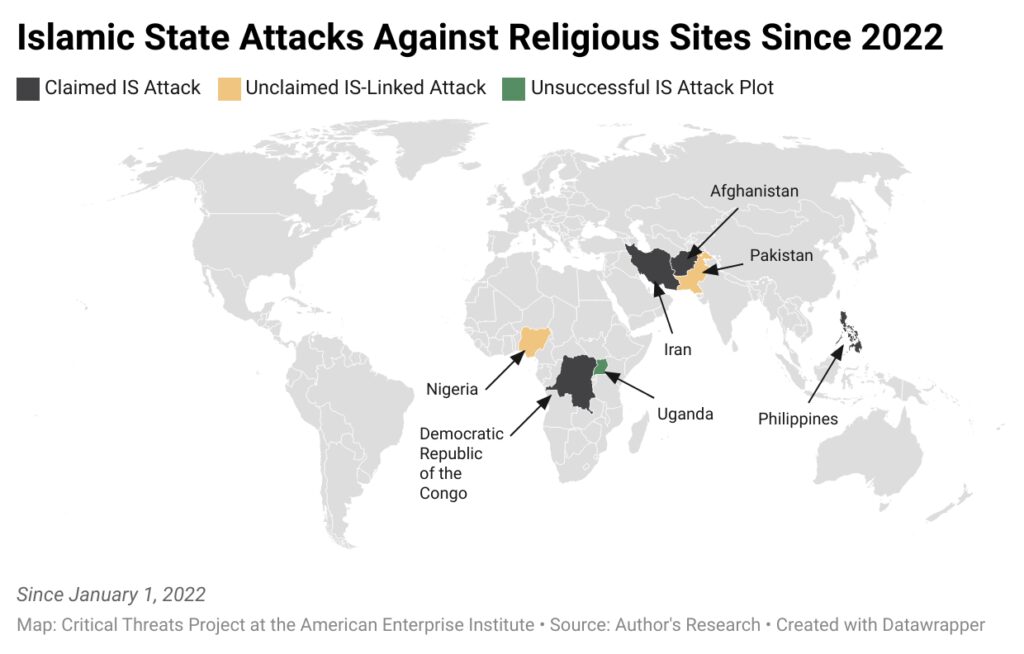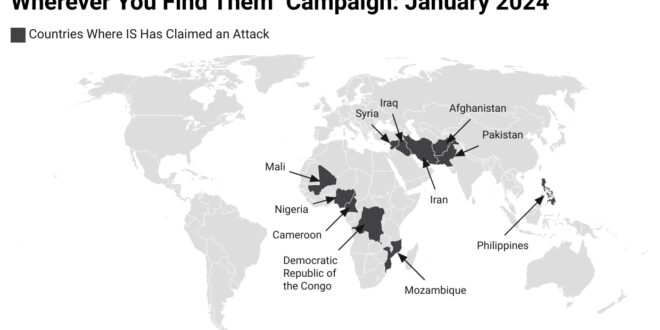Data Cutoff: January 10, 2024, at 10 a.m.
Key Takeaway: IS affiliates across sub-Saharan Africa have claimed attacks as part of the new IS global campaign and could attempt to carry out high-visibility attacks against civilians and religious sites in their areas of operation to maximize the propaganda value of the campaign. IS central media is branding the campaign as supportive of the Palestinian cause in response to the Israel-Hamas war and is also encouraging lone-wolf attacks against civilians in the West.
IS affiliates across sub-Saharan Africa have claimed attacks as part of the new global campaign that IS launched with the January 3 bombings in Kerman, Iran. The Islamic State’s Central Africa Province (ISCAP), Mozambique Province (ISM), Sahel Province (ISSP), and West Africa Province (ISWAP) have claimed attacks as part of the campaign since January 4.[1] The groups’ activities are broadly similar to previous IS campaigns in which the groups pursue their domestic objectives in line with typical attack targets while centrally coordinating their claims to maximize their propaganda’s impact.[2]
ISWAP notably reactivated an attack cell in central Nigeria to claim the group’s first attack in central Nigeria since 2022 as part of the campaign.[3] Militants attacked a supermarket in Maraba, Nasarawa State, central Nigeria, on January 2.[4] Local media said the attack killed four people, whom ISWAP branded as Christians in its claim on January 5.[5] This is in line with the group’s ongoing effort since 2022 to open a new front against the Nigerian government in more Christian and politically and economically sensitive parts of Nigeria compared to its core area of operations in the northeast.[6]
ISM has significantly increased its rate of attacks, specifically against Christian civilians, to boost the campaign.[7] ISM carried out at least 18 attacks between January 3 and 8 across three different districts in northern Mozambique’s Cabo Delgado province, according to Mozambican media.[8] ISM has claimed at least four of these attacks.[9] ISM only averaged 10 engagements per month in 2023, according to the Armed Conflict Location and Event Database (ACLED).[10] The January attacks have primarily targeted civilians in Christian villages, which is in line with the group’s historical attack patterns. Attacks on civilians accounted for nearly 80 percent of its activity from 2017 to 2019, and the group has continued killing civilians who would not cooperate with it at a high rate, even as civilian attacks have become a smaller proportion of its overall activity since 2020.[11]
ISSP and ISCAP activity has aligned with the groups’ typical operations.[12] The affiliates have claimed at least two and three attacks respectively as part of the campaign since January 4.[13] ISSP targeted Malian forces and a rival Tuareg ethnic militia in northeastern Mali, while ISCAP targeted Christian villages in northeastern Democratic Republic of the Congo (DRC).[14]
Figure 1. Islamic State Affiliates Claim Attacks Under “Kill Them Wherever You Find Them” Campaign: January 2024

IS central media is branding the campaign as the group’s response to the Israel-Hamas war and in support of Palestinian Muslims. IS officially launched the campaign on January 4 with a 30-minute speech from its spokesperson discussing the Israel-Hamas war. The spokesperson condemned Israel’s actions, denounced Hamas for being nationalist and a proxy of “polytheistic” Shi’ite factions in Iran’s “Axis of Resistance,” and criticized Arab “tyrants” for standing with Israel.[15] The spokesperson emphasized that Iran’s “expansionist plans, projects, and conspiracies against Muslims are no less dangerous and hateful than the plots and hatred of the Jews and Crusaders [Christians].”[16] He then used this framing to call for the killing of “the Jews, Crusaders [Christians], and their criminal allies [non-Salafist Sunni and Shi’ite Muslims]” around the world so Israel has no allies left.[17] An IS-linked media unit reiterated these themes in a statement on January 9 that said the campaign “includes real, practical support” for Muslim Palestinians by fighting all axes, governments, and armies that Israel “rely [on] and fight behind.”[18]
Lone-wolf attackers and Islamic State affiliates could attempt to carry out high-visibility attacks against civilians and religious sites to boost the global campaign. The IS spokesperson specifically called for its followers to target the easy before the difficult, the civilian before the military, and religious targets above all else. A US intelligence report from early December 2023 warned that al Qaeda and IS would likely use the Israel-Hamas war to encourage calls for lone-wolf attacks and that primary targets would be churches, synagogues, and members of the Jewish community.[19]
IS affiliates will attempt to orchestrate such high-visibility attacks on a larger scale in their respective areas of operation over the next month. The January 3 bombings in Iran that killed at least 91 civilians were in line with this guidance.[20] IS affiliates have also established a clear precedent for attacks on religious sites, either attacking or attempting to attack religious sites in seven different countries since the beginning of 2022.[21]
Figure 2. Islamic State Attacks Against Religious Sites Since 2022

ISCAP and ISWAP are the best-positioned sub-Saharan affiliates to carry out such attacks. ISCAP already unsuccessfully tried to conduct bombings targeting churches and religious figures near the Ugandan capital with improvised explosive devices (IED) and mail bombs in September and October 2023.[22] ISCAP has also attempted to bomb civilians at bars or music festivals in the DRC and Uganda, believing all in attendance are either Christian or unfaithful Muslims.[23] The group successfully carried out several high-profile attacks in western Uganda near the border with the DRC in 2023, including a massacre targeting schoolchildren in June 2023 and an attack that killed two British and South African tourists in October 2023.[24] The attacks in Uganda comprise a retaliatory campaign in response to Uganda’s counterinsurgency operations against the group’s havens in northeastern DRC that began in November.[25] The campaign also aims to distract and divert Ugandan forces from the DRC.[26]
ISWAP demonstrated its willingness and capabilities to conduct high-visibility attacks on civilians and hardened targets in central Nigeria. The group carried out at least 15 attacks in central Nigeria between April and December 2022.[27] This included high-publicity attacks such as a prison break in the Nigerian Federal Capital Territory in July and an attempt to assassinate the Nigerian president with a vehicle-borne IED in December.[28] The group was also likely behind a massacre at a Catholic church that killed 40 people in June 2022 and a credible threat that led to the evacuation of nonessential personnel and family from the US embassy in Abuja in October 2022.[29] ISWAP cells in central and southeastern Nigeria have also conducted several IED attacks targeting bars.[30]
ISWAP has retained at least limited attack capabilities in central Nigeria, despite Nigerian security forces degrading ISWAP cells in central Nigeria throughout 2023. Police arrested key members of the cell in Kogi state—which contributed to most of the group’s attacks in central Nigeria—in January 2023.[31] Security forces broke up a likely ISWAP cell in Nasarawa State in May 2023 and raided safe houses that had IEDs in Nassarawa and Kogi in June 2023.[32] Security forces also arrested suspected members of a cell near the capital in October 2023.[33] This pressure led to zero ISWAP attacks in central Nigeria from December 2022 until the January 2, 2024, supermarket shooting in Nasarawa State. It is unclear if the group retains the capabilities needed for IED or other highly coordinated attacks, given its lack of activity under sustained pressure in 2023. Unsophisticated small-arms attacks in central Nigeria like the supermarket shooting will still support the campaign with high-profile coverage because they’re outside the group’s main area of operations and in a more politically sensitive and predominantly Christian part of Nigeria.
ISM has more limited capabilities than ISCAP and ISWAP. ISM averaged one IED or grenade attack per month throughout 2023 and did not conduct any IED attacks in the last two months of 2023, according to the ACLED.[34] This is part of a general downturn in activity since November 2022, due to successful counterinsurgency pressure from regional forces.[35] The UN estimated in July 2023 that regional operations reduced the group to about 300 fighters.[36] The group has also only used IEDs against roadside targets and never infiltrated crowded civilian targets to conduct an IED attack or suicide bombing.[37] These constraints will limit its operations to continuing small-scale attacks against Christian villages.
ISSP primarily operates in majority Muslim areas and, therefore, has fewer appealing soft targets for the propaganda campaign. However, the group brands the Malian government and its forces as Christians and apostates and has also inscribed pro-Palestinian slogans on its weapons to maximize its propaganda impact.[38]
 Eurasia Press & News
Eurasia Press & News




